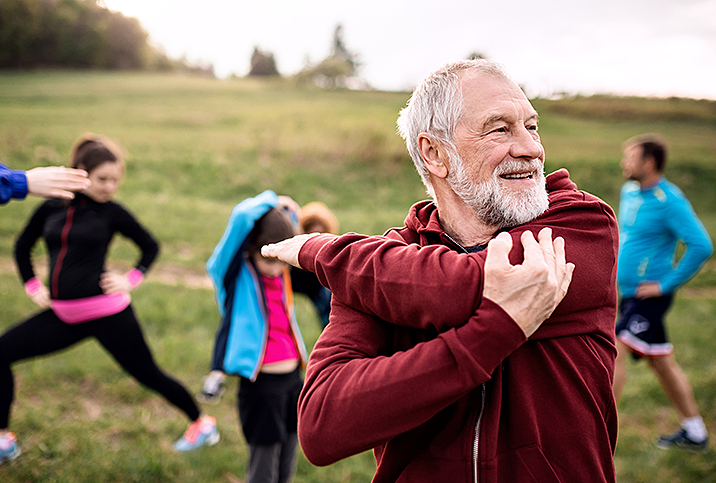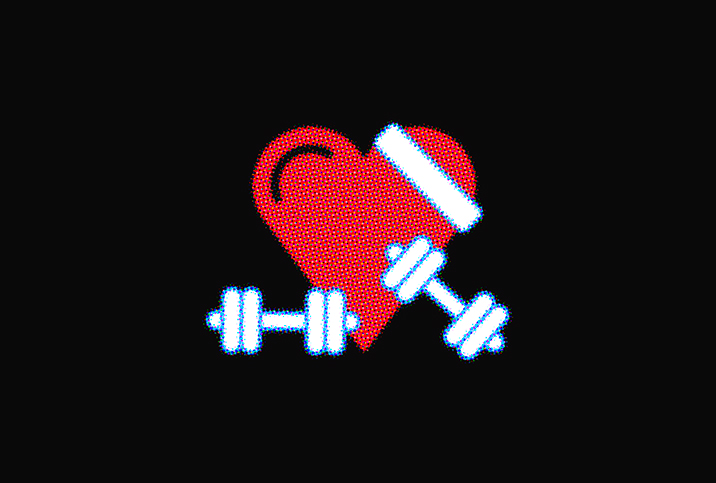Fill Your Prescription for Exercise

Everyone should know exercise is important. From helping to maintain a healthy weight to promoting better sleep and improving mood, exercise is one of the most straightforward ways to manage health daily.
Still, too many people find some reason or another to avoid exercise. Too busy. Too tired. Too unmotivated. Too uncomfortable to be seen working out. Humans are really quite excellent at justifying being lackadaisical, even when they know the potential risks of a sedentary lifestyle: immune system issues, loss of muscle, weight gain, heart disease, metabolic syndrome and more.
A less-discussed issue, however, might be a good motivator for men who have trouble getting off the couch: erectile dysfunction (ED).
How heart health affects erections
Compared to other organs in the human body, the structure of the penis is relatively simple—even if its processes aren't. It consists of three layers of spongy tissue that fill with blood when a man is aroused during an erection, and beyond that, there isn't much to its "makeup." A man's ability to get an erection directly relates to his body's ability to pump blood, so it should be clear how heart-related problems could inhibit that ability.
We can view it another way, with ED as a warning sign of a heart condition and other conditions, including diabetes. Since the arteries that supply blood to the penis are smaller than the ones that supply the heart, erectile issues often preclude coronary artery disease (CAD), because the plaque buildup in the arteries doesn't take as long.
For some patients, the link between ED and heart problems is incredibly clear, for example, when an artery blockage in the pelvis limits the amount of blood flow to the penis or a traumatic injury causes scarring after white blood cells repair the damaged area.
Regardless of cause, heart health and erectile function are inextricably linked, which means if you want to maintain normal sexual functioning as you age, then you need to pay attention to your heart.
"From a patient perspective, it's really about being aware of your risk," said Jean Joseph, M.D., a urologist at University of Rochester Medical Center in New York. "We have a Men's Health Day annually, and the conversation is always about repetitive activities. What can we do to prevent things that are bound to come? As we get older, different things attack us."
Exercises to strengthen your heart
"There's no question that exercise is good for cardiovascular health and health generally, both as a primary prevention for people who don't have evidence of disease and as secondary prevention for people who have a disease like high blood pressure, to prevent future problems," said Richard Josephson, M.D., a cardiologist at University Hospitals Harrington Heart & Vascular Institute and the medical director of cardiovascular and pulmonary rehabilitation at UH Cleveland Medical Center.
For people averse to exercise, taking the initial steps toward a regular exercise routine might seem intimidating. It's difficult to establish new, healthy habits, especially if you've become used to a certain way of life. It's not called the "comfort zone" for no reason. Plus, for anyone accustomed to instant gratification, establishing a habit now that might only benefit them later is a tougher sell than, say, a Manhattan and a soak in the tub.
"[Luckily,] the greatest benefit for exercise accrues to people at the lower end of physical activity, meaning getting a couch potato to get outside and walk for a few minutes several days a week is probably more beneficial than getting someone who runs five days a week to run a little further those five days," Josephson said.
You don't need to push yourself to the limit, either. As Josephson explained, most doctors recommend patients get moderate exercise for 30 minutes a day, five days per week. Moderate exercise can be as simple as taking a walk around the neighborhood. Even chores, such as mowing the lawn, vacuuming or washing your windows, count. When you look at it this way, it's basically a two-for-one deal.
Alternatively, Josephson said, people can opt to engage in vigorous exercise for 25 minutes a day, three days a week. These forms of exercise—including most sports, hiking, jogging and carrying heavy loads—provide more body benefits, so people don't need to engage in them for quite as long.
However, there's a difference between physical activity and exercise, Josephson warned.
"There's been a variety of studies looking at what's the least amount of time one could exercise to get cardiovascular benefits, and the answer seems to be somewhere between five and 10 minutes," he said. "That is to say, if you were to do some exercise for one or two minutes, you might burn calories. You might get stronger, but in terms of providing cardiovascular benefit, that's less."
Take restaurant employees as an example. While servers are on their feet for long periods of time and certainly might burn a fair number of calories as they traverse the restaurant floor throughout the day, they generally walk for only a moment or two before they stop to do something else, like take an order or fill up drinks. They're not receiving the same cardiovascular benefit as someone who walks briskly for 30 uninterrupted minutes, Josephson said.
Ease into it
As for how we can get started, it's best to ease into any exercise or activity.
"There's the old adage with exercise: Start low and go slow," Josephson said. "You know, the idea is to come up with a habit that you can sustain for many, many years. You don't have to reach your plateau in a few days."
The goal of establishing a daily, moderate exercise routine is mainly prevention. On some level, people start because they know they need to and because the mild discomfort of getting off the couch and moving around can help them avoid issues down the road.
After all, when health problems accrue, it's a cascade of events.
"Therefore, let's get upstream and do the preventative," Joseph said. "I think that's how men should think about it: the analogy, no pain, no gain."


















